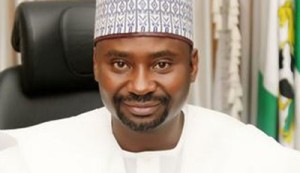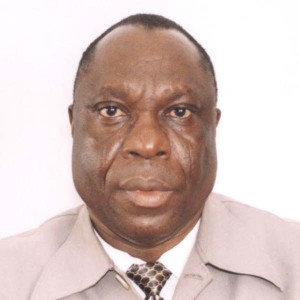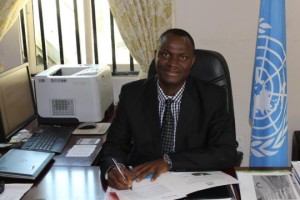Under the aegis of the FGN/UNDP 8th Country Programme, a three-day forum that ended in Makurdi has validated three technical reports, under a programme aimed at enhancing Disaster Risk Management (DRM) in the country
The Director General, National Emergency Management Agency (NEMA), Muhammed Sani Sidi, has identified the FGN/UNDP 8th Country Programme validation as very critical to Nigeria in general and the agency in particular.
According to the DG who spoke Wednesday at the opening of a three-day Validation Workshop on FGN/UNDP 8th Country Programme that held at the Hallydays Hotel and Resort, Makurdi in Benue State, the programme would greatly enhance Disaster Risk Management (DRM) in the country.

Sidi, who was represented by Vincent Owam, Deputy Director (SAR), NEMA, charged participants to participate professionally so that the objective of the workshop would be met.
Stressing further, he gave special thanks to the Federal Government of Nigeria (FGN), United Nations Development programme (UNDP) and other partners for supporting the programme.
Essentially, NEMA is benefiting from the FGN/ UNDP 8th country programme in the area of strengthening the capacity of NEMA and other relevant agencies to coordinate, promote and participate in preparedness, mitigation and response to threats, crisis and changes.
Project reports on subjects like: Mainstream gender in Disaster Risk Management (DRM) policies, planning and frameworks; Developing National DRM Information and Communication Systems; and Developing capacity for undertaking disaster risk identification, monitoring and assessment had been submitted by project consultants.
As part of the finalisation of the projects, participants at the forum set out to validate the reports.

Speaking on the second day of the workshop’s technical session, Professor Emmanuel Oladipo of the University of Lagos who chaired the session, noted that disaster risk management is imperative in addressing disasters in the country.
According to him, the validation workshop is a step in the right direction in ensuring that the country has a viable data on risk management, adding that the process is not exhaustive as the documents stand to be scaled up in future.
In his vote of thanks on the last day of the workshop on Friday, Deputy Director, Department of Disaster Risk Reduction, NEMA, Kayode Fagbemi, who thanked participants for their attendance, said, “We are evolving as an agency that is why we organised this workshop for your help in improving the documents we proposed for effective disaster management, before validation for the FGN/UNDP 8th Country Support Programme.”
“We are trying to identify gaps and fill them up,” he added.
The workshop had participants from different technical groups such as the academia, civil society organisations (CSOs), media and ministries, departments and agencies (MDAs), among others.
To kick-start the implementation of its Country Programme for 2014-2017, UNDP in January 2014 held a three-day work-planning workshop with representatives from the six states selected as implementing partners: Anambra, Ekiti, Gombe, Kogi, Niger and Sokoto. Together, UNDP and the states’ representatives reached an agreement on the main elements of proposed development cooperation and produced draft annual work plans accordingly.

The consultations, led by UNDP’s Country Director, Dr. Pa Lamin Beyai, were intensive and hands-on. They focused on fine-tuning the common areas of programme design, on discussing a Memorandum of Understanding to guide the development partnership.
The planning process was intensively consultative and inclusive. It started with the national vision, as contained in Nigeria’s Vision 20:2020 strategic plan, and with the development challenges and priorities of each state, a synopsis of which was shared.
The Country Director emphasised UNDP’s development mandate in response to national and state priorities. He expressed happiness at the high level of representation from the states – which included a Secretary to the State Government and Commissioners of Budget and Planning ministries. The Country Director commended the states for both financial commitment (counterpart cost-sharing) as well as their focus on crafting meaningful activities that are linked to the UN Development Assistance Framework (UNDAF) and its implementation plan (UNDAP), as well as the UNDP Strategic Plan.
This planning discussion took place against a rapidly evolving funding environment. Both constraints and opportunities were emphasised. There was consensus around the need to craft development programmes that focus on those areas where partners’ finite resources can make the most impact– or the “most bang for the buck” – in line with corporate direction and changing development landscape. The planning workshop was an important opportunity to build partnerships and mobilise resources for the Nigeria programme, and to leverage core resources (‘TRAC’) as a catalyst to attract counterpart cost-financing. Indeed, a measure of the success of the workshop was the commitment by the states to contribute two dollars for each development dollar provided by UNDP Nigeria. In addition to the critical role of resource mobilisation, the planning workshop also demonstrated inherent capacity building elements. By holding a major workshop of this nature with the partner states, UNDP enhanced the planning capacities of the states – along the lines of Results Based Management.
The teams from the states were led by the following high level officials:
• Mrs. Michelle Onugbolu (Anambra State Programme Manager)
• Hon. Oyebanji Abiodun (Ekiti State Commissioner of Planning and Budget)
• Hon. Danladi Mohammed (Gombe State Commissioner for Economic Planning)
• Hon. Osaniashi Olatunji (Kogi State Commissioner for Budget and Planning)
• Mallam Idris Kusogi (Niger State Director, State Planning Commission), and
• Alhaji Sahabi Isah Gada (Sokoto State Secretary to the Government).
Mr. S.O Elohor, the Deputy Director, International Cooperation of the National Planning Commission, the coordinating ministry for development cooperation, represented the Executive Secretary of the Commission at the meeting with the states. He charged the states to be focused on their development activities and to plan for effective development results.
